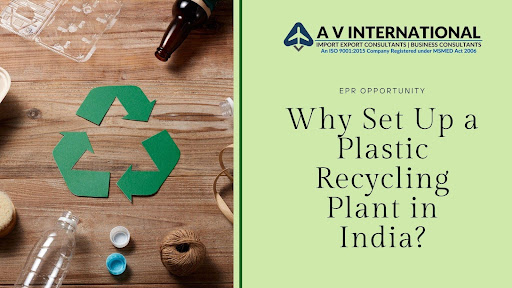EPR Registration Opportunity – Why Set Up a Plastic Recycling Plant in India?

Indian government is pushing environmental sustainability initiatives and has launched EPR (Extended Producer Responsibility) Rules 2022 making it mandatory for all the producers, importers, brand owners and plastic waste processors to get EPR Registration to ensure proper recycling of plastic waste. Although, the EPR Registration Policy is going to benefit all the stakeholders and also the environment in India. The highest beneficiary of the EPR policy is the recycler since all the stakeholders have to tie up with a recycler to get the plastic waste recycled to meet their respective targets.
And hence the recyclers now not only sell the recycled plastic granules but also charge the producers, importers and brand owners to recycle their plastic in exchange for plastic credits thereby meeting their targets. Therefore, this double benefit to the recyclers has created a significant market opportunity for new entrants in the plastic recycling industry.
In this article, lets breakdown the step-by-step process of setting up a plastic recycling plant along a realistic business plan with costing and approximate profit margin calculation.
Step-by-Step Process for Setting Up a Plastic Recycling Plant
1. Identify the Type of Plastic You Want to Recycle
The two broad categories are:
- Post-Industrial Waste (cleaner, easier to process)
- Can further be segregated into –
- Rigid Plastic
- Flexible Plastic
- Multilayered Plastic
- Compostable Plastic
- Can further be segregated into –
- Post-Consumer Waste (dirtier, requires washing) Common plastics: LDPE, HDPE, PP, PET.
- Can further be segregated into –
- Rigid Plastic
- Flexible Plastic
- Multilayered Plastic
- Compostable Plastic
- Can further be segregated into –
2. Choose the Right Location
An idealistic location for a recycling plant would be where there is ample space for machinery and material (raw materials and produce), easy access to plastic waste vendors, availability of labour, and cheaper rent. Industrial areas (eg: including MIDC zones in Maharashtra) are the best location to set up a recycling plant.
3. Get the Required Licenses
Some of the requisite licenses include:
- MSME/Udyam Registration
- GST Registration
- Factory License
- Pollution NOC (Consent to Establish and Consent to Operate) from State Pollution Control Board (e.g., MPCB in Maharashtra)
- EPR Plastic waste Registration for a PWP Category
4. Source the Right Machinery
The most important part is to procure the right type of machinery for a recycling plant to take the best advantage of the EPR registration Policy. A full recycling plant typically includes:
- Crusher/Shredder
- Washing Line/Equipment (if processing plastic waste with dirt and impurities)
- Drying Equipment
- Agglomerator (optional)
- Plastic Extruder
- Cooling Tank
- Granule Cutter (Pulitzer)
Machinery Details and Estimated Costs
| Machinery | Purpose | Estimated Cost |
| Shredder/Crusher | Reduces size of plastic waste | ₹2 lakhs – ₹10 lakhs |
| Plastic Washing Line | Cleans dirty plastic waste | ₹15 lakhs – ₹30 lakhs |
| Plastic Dryer | Removes moisture/wetness | ₹2 lakhs – ₹10 lakhs |
| Agglomerator | Densifies soft processed plastic | ₹5 lakhs – ₹12 lakhs |
| Plastic Extruder (Pelletizing) | Converts small plastic particles into pellets | ₹15 lakhs – ₹40 lakhs |
| Cooling Tank + Pellet Cutter | Cools and cuts plastic strands/pellets into granules | ₹2 lakhs – ₹7 lakhs |
Cost of Setting Up a Plastic Recycling Plant in India
Here’s a basic investment breakdown:
| Item | Estimated Cost (₹) |
| Land Lease/Rent | ₹50,000–₹1 lakh/month |
| Basic Machinery Setup | ₹20 lakhs – ₹80 lakhs |
| Electrical Installation | ₹2 lakhs – ₹7 lakhs |
| Labor Setup | ₹1.5 lakhs – ₹3 lakhs |
| Licensing and Approvals | ~₹1 lakh |
| Working Capital (initial) | ~₹10 lakhs |
| Total Investment | ₹40 lakhs to ₹95 lakhs |
Expected Profitability
Here is a simple approximate profitability calculation*:
- Raw material cost (Plastic Waste): ₹15–₹45/kg
- Selling price of granules (Recycled plastic granules): ₹50–₹90/kg
- Gross margin: Around 35–45%
*Kindly note that the prices are subject to change based on factors like demand supply gap, geography, time, quantity, etc.
If you process around 300 kg/day (approx. 9 tonnes/month) and sell at ₹70/kg:
- Revenue = ₹6.3 lakhs/month
- After operational expenses (including labor, maintenance, and electricity), you could still achieve a net profit of ₹2 lakhs–₹3 lakhs/month.
- Additional Profit due to EPR Registration – You can sell 6 tonnes of plastic credits thereby generated on the EPR Portal at ₹1.5/kg to ₹5/kg and earn that extra income.
Thus, you could recover your initial investment in 1.5 to 2 years with steady operations.
Pro Tip:
- If you plan to recycle clean industrial scrap, you can avoid the washing line initially. Since plants targeting post-consumer waste, which are majorly dirty and impure, (like used plastic bags, bottles) will require an additional ₹10–₹20 lakh for washing and drying systems.
- Tie-up with more and more producers, importers, and brand owners
- One of the most important ideas will be to tie up with EPR Consultants who can give big volumes and business.
How can A V International help you?
We are A V International, India’s leading EPR Consultants. We can not only help you obtain EPR Registration but can also help you in the compliance and filing annual returns within the deadline and with AEO certification and etc. Our experienced team provides you with our end-to-end EPR Solution including documentation, application, follow-ups, answering deficiencies, obtaining EPR and execution all its compliance formalities to keep our clients up-to-date.
Setting up a recycling plant supported by the latest EPR Policy is one of the most lucrative business ideas in India today. By making the right investment in technology, infrastructure, and compliance, you can build a business that is not only profitable but also truly impactful for the planet.
Read Also: The Role of NEBOSH Certification in Building a Culture of Safety



